2016届高考英语 语法专项突破 第七节 情态动词和虚拟语气针对训练 北师大版
- 格式:doc
- 大小:109.50 KB
- 文档页数:10
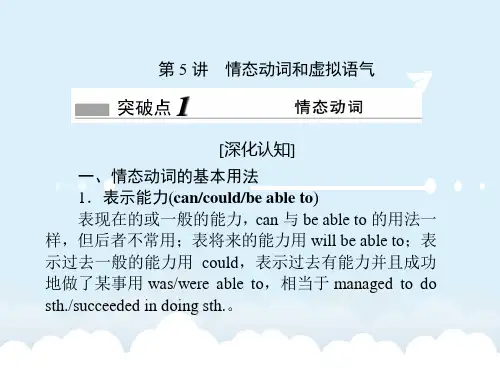
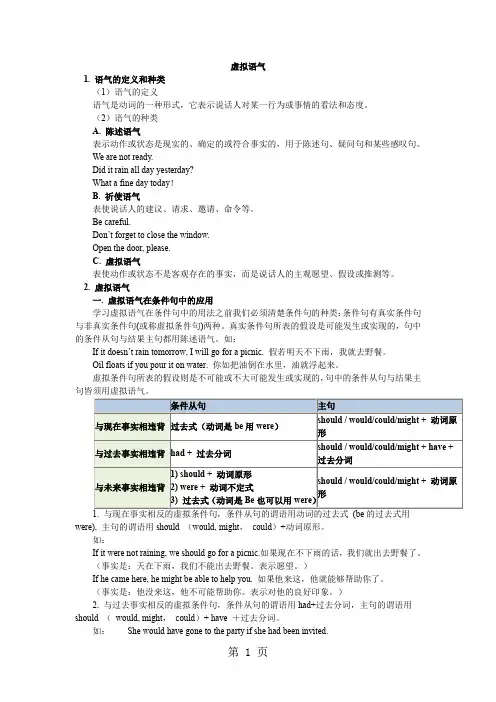
虚拟语气1. 语气的定义和种类(1)语气的定义语气是动词的一种形式,它表示说话人对某一行为或事情的看法和态度。
(2)语气的种类A. 陈述语气表示动作或状态是现实的、确定的或符合事实的,用于陈述句、疑问句和某些感叹句。
We are not ready.Did it rain all day yesterday?What a fine day today!B. 祈使语气表使说话人的建议、请求、邀请、命令等。
Be careful.Don’t forget to close the wi ndow.Open the door, please.C. 虚拟语气表使动作或状态不是客观存在的事实,而是说话人的主观愿望、假设或推测等。
2. 虚拟语气一. 虚拟语气在条件句中的应用学习虚拟语气在条件句中的用法之前我们必须清楚条件句的种类:条件句有真实条件句与非真实条件句(或称虚拟条件句)两种。
真实条件句所表的假设是可能发生或实现的,句中的条件从句与结果主句都用陈述语气。
如:If it doesn’t rain tomorrow, I will go for a picnic. 假若明天不下雨,我就去野餐。
Oil floats if you pour it on water. 你如把油倒在水里,油就浮起来。
虚拟条件句所表的假设则是不可能或不大可能发生或实现的,句中的条件从句与结果主句皆须用虚拟语气。
条件从句主句与现在事实相违背过去式(动词是be用were)should / would/could/might + 动词原形与过去事实相违背had + 过去分词should / would/could/might + have +过去分词与未来事实相违背1) should + 动词原形2) were + 动词不定式3) 过去式(动词是Be也可以用were)should / would/could/might + 动词原形1. 与现在事实相反的虚拟条件句,条件从句的谓语用动词的过去式(be的过去式用were), 主句的谓语用should (would, might,could)+动词原形。
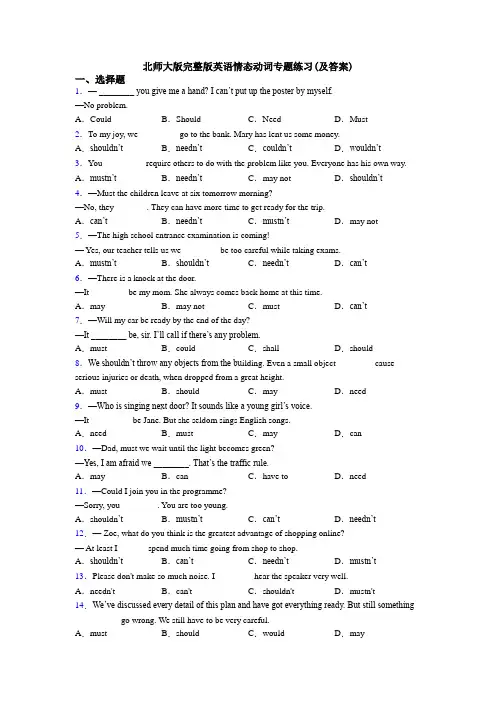
北师大版完整版英语情态动词专题练习(及答案)一、选择题1.—________ you give me a hand? I can’t put up the poster by myself.—No problem.A.Could B.Should C.Need D.Must2.To my joy, we_________ go to the bank. Mary has lent us some money.A.shouldn’t B.needn’t C.couldn’t D.wouldn’t3.You ________ require others to do with the problem like you. Everyone has his own way. A.mustn’t B.needn’t C.may not D.shouldn’t 4.—Must the children leave at six tomorrow morning?—No, they _______. They can have more time to get ready for the trip.A.can’t B.needn’t C.mustn’t D.may not 5.—The high school entrance examination is coming!— Yes, our teacher tells us we ________ be too careful while taking exams.A.mustn’t B.shouldn’t C.needn’t D.can’t 6.—There is a knock at the door.—It ________ be my mom. She always comes back home at this time.A.may B.may not C.must D.can’t7.—Will my car be ready by the end of the day?—It ________ be, sir. I’ll call if there’s any problem.A.must B.could C.shall D.should8.We shouldn’t throw any objects from the bu ilding. Even a small object ________ cause serious injuries or death, when dropped from a great height.A.must B.should C.may D.need9.—Who is singing next door? It sounds like a young girl’s voice.—It _________ be Jane. But she seldom sings English songs.A.need B.must C.may D.can 10.—Dad, must we wait until the light becomes green?—Yes, I am afraid we ________. That’s the traffic rule.A.may B.can C.have to D.need 11.—Could I join you in the programme?—Sorry, you ________. You are too young.A.shouldn’t B.mustn’t C.can’t D.needn’t 12.— Zoe, what do you think is the greatest advantage of shopping online?— At least I ______ spend much time going from shop to shop.A.shouldn’t B.can’t C.needn’t D.mustn’t 13.Please don't make so much noise. I ________ hear the speaker very well.A.needn't B.can't C.shouldn't D.mustn't 14.We’ve discussed every detail of this plan and have got everything ready. But still something __________ go wrong. We still have to be very careful.A.must B.should C.would D.may15.When I was young, my father ___________ take me to climb the hill which was not far from our house.A.may B.must C.would D.should 16.—Shall we go camping this summer holiday?—Nothing________be better.A.should B.could C.must D.may17.My bike was broken yesterday,so I____walk home.A.might B.had to C.must D.could 18.—Would you please________in that way? That’s not safe!—Sorry. I won’t do it any more.A.not driving B.not to drive C.no driving D.not drive 19.—Will your mother be at home this Saturday?—Hard to say. She _______go to the countryside to see my grandparents.A.must B.may C.can D.would20.Our Chemistry teacher always tells us we ________ be too hardworking before the exams. A.mustn’t B.shouldn’t C.needn’t D.can’t 21.—Could you tell me how to renew the library books?—With pleasure. You ________ come to our desk every time. It’s easier to renew them online. A.can’t B.mustn’t C.needn’t D.shouldn’t 22.According to the rule, used batteries ________ be dropped in the red bin for harmful wastes. A.may B.would C.should D.might23.—Is that Mr Zhou?—It ________ be him. He has gone to Beijing.A.can B.may C.can’t D.shouldn’t 24.—In China, many parents complain that their children have to stay up late to do the homework.—Don’t worry. The government has realized the problem. I’m sure there ________ be good news soon.A.can B.should C.need D.must25.—Is it usually warm in Yancheng in May?—Yes. But it _______ be rather cold sometimes.A.must B.should C.would D.can26.You ________ pay too much attention to protecting yourself if you plan to go abroad. A.mustn’t B.can’t C.shouldn’t D.needn’t 27.When people are waiting at the zebra crossing, cars and buses ________ wait and let them go first.A.must B.may C.can D.need28.—Must we stop the Japanese government discharging nuclear waste water (排放核污水) into the Pacific Ocean?—________. Because everyone should protect our earth and it is bad ________ us to eat the polluted seafood and drink the waste water.A.Yes, we can; of B.No, we mustn’t; of C.Yes, we must; for D.No, we needn’t; for 29.Hurry up, or we ________ miss the beginning of the film.A.should B.must C.may D.have to 30.Cars ________ give way to walkers on some roads in Binhai, or the drivers will be fined. A.may B.will C.can D.must 31.—What is that young lady’s jo b?—She ________ be a nurse, I’m not sure.A.must B.may C.need D.would32.For the safety of the passengers, objects like guns ________ be carried on board.A.may not B.needn’t C.might not D.mustn’t 33.—How beautiful the winter jasmines (迎春花) are!—Yes. These golden-yellow flowers ________ be widely seen in my city in March.A.must B.can C.would D.should 34.—Mum, I bought some strawberries on my way home.—Oh, you’re so sweet. But the strawberries ________ be put into the fridge for freshness. A.must B.can C.may D.need35.—May I have some wine to drink?—No, you ________. You have to drive home later.A.mustn’t B.needn’t C.can’t D.may not36.—I think they are enough. We ________ make so many chairs.—I don’t think so. Because nearly a quarter of them need ________.A.don’t need to; mending B.needed; to be mendedC.don’t need; mend D.need; to mend37.We teenagers ________ have dreams. With dreams and hard work, anything amazing________ be created.A.may; can B.might; should C.should; can D.must; has to 38.—Wh o’s singing next door? Is it Miss Wang?—It ________ be her. She’s having the board meeting.A.can’t B.shouldn’t C.mustn’t D.needn’t 39.—Do we have to finish this today?—Yes, you ________ . Today is the last day.A.would B.may C.can D.must40.Look at the floor, Tom! ________ you watch TV while having a meal?A.Should B.Could C.Must D.May【参考答案】一、选择题1.A解析:A【详解】句意:——你能帮我一把吗?我一个人贴不起海报。
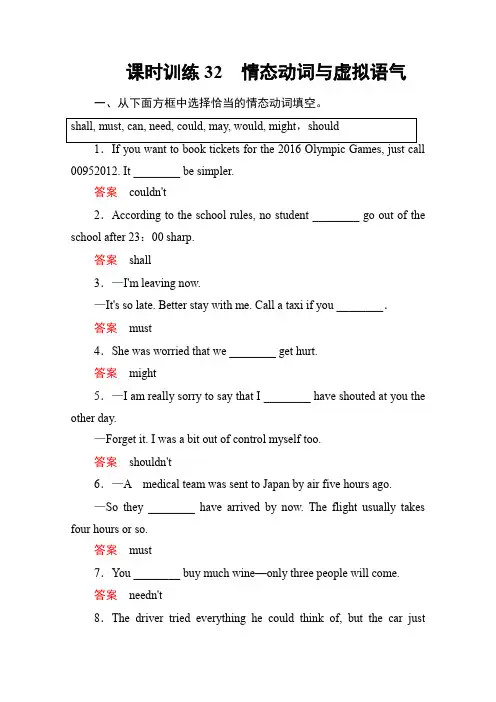
课时训练32情态动词与虚拟语气一、从下面方框中选择恰当的情态动词填空。
00952012. It ________ be simpler.答案couldn't2.According to the school rules, no student ________ go out of the school after 23:00 sharp.答案shall3.—I'm leaving now.—It's so late. Better stay with me. Call a taxi if you ________.答案must4.She was worried that we ________ get hurt.答案might5.—I am really sorry to say that I ________ have shouted at you the other day.—Forget it. I was a bit out of control myself too.答案shouldn't6.—A medical team was sent to Japan by air five hours ago.—So they ________ have arrived by now. The flight usually takes four hours or so.答案must7.You ________ buy much wine—only three people will come.答案needn't8.The driver tried everything he could think of, but the car just________ move.答案wouldn't9.It is important to know about the cultural differences that ________ cause problems.答案may10.Don't play with the dog, Jack, for it ________ be dangerous at times.答案can二、根据所提供的情景,用适当的情态动词完成句子。
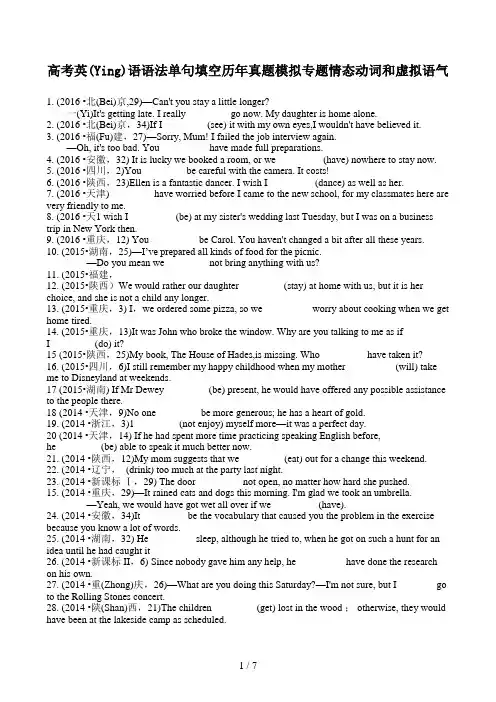
高考英(Ying)语语法单句填空历年真题模拟专题情态动词和虚拟语气1. (2016 •北(Bei)京,29)—Can't you stay a little longer?一(Yi)It's getting late. I really_________go now. My daughter is home alone.2. (2016 •北(Bei)京,34)If I_________(see) it with my own eyes,I wouldn't have believed it.3. (2016 •福(Fu)建,27)—Sorry, Mum! I failed the job interview again.—Oh, it's too bad. You _________ have made full preparations.4. (2016 •安徽,32) It is lucky we booked a room, or we _________(have) nowhere to stay now.5. (2016 •四川,2)You_________be careful with the camera. It costs!6. (2016 •陕西,23)Ellen is a fantastic dancer. I wish I_________ (dance) as well as her.7. (2016 •天津)_________have worried before I came to the new school, for my classmates here are very friendly to me.8. (2016 •天1 wish I _________(be) at my sister's wedding last Tuesday, but I was on a business trip in New York then.9. (2016 •重庆,12) You _________ be Carol. You haven't changed a bit after all these years.10. (2015•湖南,25)—I’ve prepared all kinds of food for the picnic.—Do you mean we_________not bring anything with us?11. (2015•福建,12. (2015•陕西)We would rather our daughter_________(stay) at home with us, but it is her choice, and she is not a child any longer.13. (2015•重庆,3) I,we ordered some pizza, so we _________ worry about cooking when we get home tired.14. (2015•重庆,13)It was John who broke the window. Why are you talking to me as ifI_________(do) it?15 (2015•陕西,25)My book, The House of Hades,is missing. Who_________ have taken it?16. (2015•四川,6)I still remember my happy childhood when my mother _________ (will) take me to Disneyland at weekends.17 (2015•湖南) If Mr Dewey_________(be) present, he would have offered any possible assistance to the people there.18 (2014 •天津,9)No one_________be more generous; he has a heart of gold.19. (2014 •浙江,3)1_________(not enjoy) myself more—it was a perfect day.20 (2014 •天津,14) If he had spent more time practicing speaking English before,he_________(be) able to speak it much better now.21. (2014 •陕西,12)My mom suggests that we_________(eat) out for a change this weekend.22. (2014 •辽宁,_(drink) too much at the party last night.23. (2014 •新课标Ⅰ,29) The door_________ not open, no matter how hard she pushed.15. (2014 •重庆,29)—It rained cats and dogs this morning. I'm glad we took an umbrella.—Yeah, we would have got wet all over if we _________(have).24. (2014 •安徽,34)It_________ be the vocabulary that caused you the problem in the exercise because you know a lot of words.25. (2014 •湖南,32) He_________ sleep, although he tried to, when he got on such a hunt for an idea until he had caught it26. (2014 •新课标 II,6) Since nobody gave him any help, he _________ have done the research on his own.27. (2014 •重(Zhong)庆,26)—What are you doing this Saturday?—I'm not sure, but I _______ go to the Rolling Stones concert.28. (2014 •陕(Shan)西,21)The children_________(get) lost in the wood ; otherwise, they would have been at the lakeside camp as scheduled.29. (2014 •安(An)徽,28)I_________(go) to my cousin's birthday party last night,but I was not available.30. (2016 •河南(Nan)洛阳第一次统考)The only thing that I _________do was that 1 wished hera long life.31 (2016 •温州(Zhou)八校高三联考)32 (2016 •江西师大附中等五校联考)It has been accepted that all the students_________put on masks before going to school in case they are infected with flu virus.33. (2016 •山西高三二诊)There was a little mouse staying at home all day. I_________ go out, even at night.34. (2015•甘肃会宁五中第三次月考)I have her telephone number. You_________call her if you like.35 (2015•河北衡水中学高三六调)I think something_________ have happened to Jill.36. (2015•新疆师大附中 12 月月考)Some students prefer to consider majors first so thatthey_________ learn what they are interested in.37 (2015•辽宁大连六校期末联考)But he_________give up.38. (2015•甘肃白银会宁五中11月月考)Now I_______ like to ask you to look at some photographs if you don't mind39 (2015•安徽六校教研会联考)Anyone________be in a rough life time, whether he is "Bai Fumei" or "Gao Fushuai".专题综合测试一、单句填空1. I got up early this morning, but I_________ not have done so because I don't work on Sundays.2. He_________ have finished his report last night, but he was watching TV the whole night3. She_________ be nearly 90 years old now.4. All students_________wear school uniform in school.5. "If only I_________(can) turn back time, I would scold him severely," she said regretfully.6. If I_________(be) you, I,d talk to your English teacher. He might have some good ideas.8. —WillHe_________stay9. You should pay a lot of attention to children's ideas? sometimes they_________be really creative.10. You _________ use your cell phone here in our hospital because it's forbidden.11. It_________have been raining heavily when he got back home for he was wet all over.12. 1 wish I_________(know) what is going to happen.13. The old woman treats these boys as if they_________(be) her own children.14. It,s high time that we_________(get) down to our study. jwe_________often have coffee together.二、语法填空Passage 1Drunk driving, a major concern currently, is not a funny thing, (1)_Two months ago, after (2)________ (drink) a lot of alcohol, my friend's uncle drove his car home. He was (3)________ (heavy) drunk, but he still drove home by (4)________ . On the road near his home, an old lady was going across the road, (5)________ his uncle didn't notice her and he was still moving on under the influence of alcohol. And the old lady didn’t see his uncle, either. In the end, the lady died.(6)________ it not been for his uncle’s drunkenness, the terrible accident would not have happened. If the lady hadn’t died, she would live (7)________ happy life with her daughters and sons. And his uncle’s home was also destroyed by his uncle. Therefore, two (8)________ (family) were destroyed.I wish more people (9)________ (can) realize the seriousness of drunk driving and obey the traffic regulations faithfully. Always remember:refuse (10)________ (drink) and drive, and give a safe world to you and me!Passage 2Tasui is a teenager who lives in Africa. When he was young, he had polio(小儿麻搏(Bo)症). Although he wants to go to school, he (1)________ work.Tasui is only one of millions of children (2)________ can’t go to school. Many must work to support their (3)________ (family). Therefore, more than 100 million children will never receive an education. Can anything be done? Global Campaign for Education(GCE) thinks so. It was formed (4)________ (solve) this problem. The government aims to give every person, (5)________ (especial) those in poverty, an opportunity to get an education.(6)____ (establish) in 1999, GCE is made up of 120 organizations with members in almost 100 countries. Educationis a basic human right, (7)________ GCE campaigns to realize this right It works with governments to improve education in each country.Today, nearly (1)________ in (6)________ people around the world (8)________ read or write. Not being able to read impacts a person’s job opportunities and (9)________ (increase) poverty. GCE seeks to provide teaching materials in primary students’ mother tongues. Around the wor ld, many girls are often denied an education. GCE aims to give women the same opportunities as menu GCE believes that education (10)________ change lives.Passage 3Last Saturday evening I arrived at the concert hall very early. The performance (1)________ (begin) at (7)________:(3)________0. All the seats were not free. We were so (2)________ (excite) by the special sound of heavy metal that we (3)________ help crying and jumping. Suddenly I heard the sharp sound of an ambulance and saw a young man (4)________ (take) out of the hall quickly. He (5)________ have been injured in the excitement, but this didn’t stop the concert. It still went on (6)________ (smooth). When the concert was over, the singer thanked us for our enthusiasm. We kept (7)________ (ch eer) for some time. To tell the (8)________ , I’m really crazy about the singing with heavy metal. I wish I (9)_)________ it very soon.专(Zhuan)题五情态动词和虚拟语气参考答案考(Kao)点07 情态动词和虚拟语气一、试真(Zhen)题A组)新题速(Su)递1. must句意:-你不能再多待会儿吗?-太晚了.我必须要走了,我女儿一个人在家呢.由“时间不早了 ”和“女儿一个人在家”这两个条件可以推断出“我”必须要走了.所以填must.2. hadn’t seen句意:如果不是我亲眼(Yan)看到,我是不会相信的.因为主句使用的是would have done的形式(Shi),所以从句使用过去完成时态,表示对过去的虚拟.3. should句(Ju)意:-对(Dui)不起,妈妈.我(Wo)面试又失败了.噢,太糟糕了.你本应该做充分准备的.should havedone形式表示对过去的推测,意为“本应该. . . . . . ”.4. would have句意:幸运的是我们预定了一个房间,否则现在我们就没有地方待了.由时间状语now可知,主句是对现在的虚拟,所以使用 would have.5. must句意:你一定要小心使用这部相机.它花了不少钱呢!根据句意应该用must“一定”.6. danced句意:艾伦是个极好的舞者,我多么希望我和她跳得一样好.wish从句中与现在事实相反的虚拟语气用一般过去时表达.7. needn’t句意:在来到新学校之前我本不必要担心,因为这儿的同学对我非常友好.needn’t have done表示“本没有必要做某事,但是做了”.8. had been句意:我多么希望上周二我去参加了妹妹的婚礼,但是当时我正在纽约出差.wish引导的虚拟语气,与过去事实相反用had done形式表达.9. must句意:你一定是卡罗尔,这么多年来你一点都没有变.表示肯定推测要用must.B组)经典回顾I need句意:一我已经为这次野餐准备好了各种食物.一你的意思是我们不需要再带任何东西吗?根据prepared all kinds of. . .可知,此处为“不需要再带任何东西”,故填need.2. Were句意:如果没有现代通信手段,我们需要等待数周才能获得来自世界各地的新闻.由句意和主句中的“would+动词原形”可知,逗号前是一个表示与现在事实相反的从句,应为if therewere. . . .此处条件句中的if省略,把were提到主语前,故填 Were.3. stayed句意:我们宁愿让女儿待在家里,可那是她的选择,而且她也不再是个孩子了.would rather后的宾语从句要用虚拟语气,用一般过去时表示与现在或将来相反的事实.4. needn’t句意:我已经预定了披萨,所以,当我们疲倦地到家时就没必要担心做饭了.由句中表示因果关系的so可以确定此处填 needn’t05. had done句意:是约翰打破了窗户.你为什么以好像是我打破了的语气对我说话? asif引导的状语从句中,谓语动词与wish引导的宾语从句的虚拟语气形式相同.结合语境可知,此处表示对过去的虚拟和假设,填had done.6. could句意:我的书《海兹的房屋》不见了.是谁拿走了呢?结合语境可知,此处表示对过去事实的推测,用在疑问句中,填could.7. would句意:我仍然记得我的幸福贲年,那时我母亲总会在周末带我去迪士尼乐园.would表示过去的一种习惯8. had been句意:如果杜威先生在场的话,他肯定会给那里的人们提供任何可能的帮助.结合句意可知,从句表示与过去事实相反的情况,是对过去情况的虚拟和假设,故填had been.9. can/could句意:没有人比他更慷慨;他有一颗金子般的心.根据句意以及句子结构可知,此处是否定词和比较级连用表达最高级的含义,所以用can或could.10. couldn’t have enjoyed句意:我从未玩得这么开心过—这是完美的一天.根据句意和结构可知,这里用couldn’t have done表示“不可能做过”,后面的enjoy… more是比较级,与not连用表示最高级的含义,意为“从未比这更高兴过”.11. would/should/might/could be句意:如果以前他多花点时间练习说英语的话,现(Xian)在他的英语就会说得好多了.分析句子结构可知,此处涉及错综时间的虚拟语气(Qi),从句与过去事实相反,但主句中有now,与现在事实相反,因而主句的谓语形式应用would/should/ might/could be.12. (should) eat句意:妈妈建议我们本周末出去吃饭来(Lai)换换口味.表建议、命令类的词,如:suggest, propose, demand, request,order等引导的宾语从句,谓语动(Dong)词用“(should+)动词原形”的形式.13. must havedrunk句意:哈里(Li)(现在)感觉不舒服.昨天晚上在宴会上他肯定是喝多了.根据句意可知,这里表示对过去动作的肯定推测,所以应该用must have done结构.14. would句意:不管她怎么用力,门就是打不开.主句有“即使尽力想让某事发生也达不到预期的效果”的含义,所以用would not表达.15. hadn’t句意:-一今天早上大雨滂沱.我非常高兴我们带了雨伞.——是的,如果我们不带雨伞的话一定全身都湿透了.根据句意和时间状语thismorning可知,本句是与过去事实相反的虚拟语气,所以要用hadn’t,这是if we hadn’t taken an umbrella的省略.16.co uldn’t/can’t句意:你难以完成那道练习题,不可能是词汇的原因,因为你掌握了大量的词汇.根据because引导的原因状语从句可知,本空表示有根据的否定推测.17. couldn’t句意:当他在思考一个主意的时候,尽管他很想睡着,但就是睡不着,直到把主意想出来.根据语境及“although he triedto”可知,此处说的是过去的能力,而且表示否定,填couldn’t.18. must句意:既然没有人给他任何帮助,他一定是自己做的那项19. might/may句意:—本周六你打算干什么?—我也不确定,但是我可能去听滚石乐队的音乐会.根据这里的“I'm not sure”可知,本句用might或may表示不确定的推测.20. must have got句意:孩子们一定是在树林里走丢了,否则,他们就会按照预定时间来到湖边的宿营地了.根据句意可知,这里表示对过去事情的肯定推测,所以要用must have done的结构.21. would/should have gone句意:要不是我没时间,昨天晚上我会去参加我堂妹的生曰聚会.根据句意及时间状语last night可知,前一分句表示与过去事实相反的情况.二、过模拟1. could句意:我唯一能做的事情是希望她能长寿.所填词表示能力,此处要表达我唯一“能”做的,而且根据wished判断句子应该用一般过去时,所以填could.2. should句意:既然你准备得很充分,通过即将到来的工作面试应该没问题.根据since提供的原因“准备充分”可以判断出,there not be anyproblem是“按理说应该发生”的,故本空填情态动词 should03. shall句意:为防学生感染病毒,学生们在进校前要戴上防毒面罩.在第三人称作主语的陈述句中,表示规定、规则,用shall.4. daren't句意:一整天都有一只老鼠在家里,我一天没敢出去,即使是在晚上.根据even atnight表示的递进意义判断,此处表不 “不敢”意义•故填情态动词daren't.5. can句意…我有她的电话号码,如(Ru)果你愿意你可以给她打电话.所填词表示允许,意为“你可以给她打电(Dian)话”,故用can.6. must句意:我想在(Zai)吉尔身上一定发生了什么事.根据I think…判断(Duan),所填词表示一种非常有把握的肯定推测,故用情态动词must.7. can句意:有些学生愿(Yuan)意首先考虑专业,以便能够学到自己感兴趣的知识.所填词表示可能性,故填can.8. wouldn't句意:但是他不愿意放弃.根据but表不转折及 give up的意义判断,此处说的是“不愿意”放弃,故填情态动词wouldn't.9. would句意:如果你愿意的话,现在我想让你看一些照片.I would like to do. ••是固定句式,意为“我想做. . . . . . ”.10-can句意:任何人都会有困难的时候,无论他是“白富美”还是“高富帅”.此处是情态动词用于陈述句中,表示“一时的情况”, 故用情态动词can.专题综合测试一、单句填空1. need句意:我今天早晨起得很早,但是我本来不需要这样f因为我星期天不上班.根据because提供的语境判断本空填need, needn't have done“本不需要做某事但是做了”.2. should句意:他本应该昨天晚上完成报告的,但是他整个晚上都在看电视.根据but后的句子提供的语境判断,前一句应表示“本应该……但事实上并没有……”这一与过去事实相反的情况,故填should3. must句意:她现在肯定接近90岁了.must表示对现在情况的肯定推测.4. shall句意:所有学生在校都得穿校服.在第三人称作主语的句子中,表示规定、规则用情态动词shall.5. could句意:她后悔地说:“如果时光倒流,我会很严厉地责备他.” ifonly后的句子用虚拟语气,根据would scold判断本空填could.6. were句意:如果我是你的话,我会与英语老师谈谈.或许他有好的想法.if引导的从句表示与现在事实相反的情况,所以be动词应用were.7. shall句意:任何人不准把饮料带进学生计算机房§这是规定.在第三人称作主语的陈述句中表示规定,用shall.8. may/might句意:——托尼参加今晚的派对吗?——我不确定,他或许会待在家里准备即将到来的考试.由I'm not sure判断本空填表示把握不大的推测的情态动词may或might.9. can句意:你应该多注意孩子们的想法.有时候他们很有创造性.根据sometimes及陈述句判断,此处填表示偶然或一时情况的情态动词can.10. mustn't句意:你不能在医院使用手机,因为这是禁止的.根据原因状语判断,本空填表示禁止的情态动词mustn't.11. must句意:雨一定下得很大,因为他回到家的时候浑身都湿透了.根据for. . .提供的原因判断,此处表示对过去事情很有把握的推测,故填must.12. knew句意:要是我知道会发生什么事情就好了.wish的宾语从句用虚拟语气,再根据“what is going to happen”判断填knew.13. were句意:那位老妇人对待那些男孩子就像是自己的孩子一样.asif后的句子通常用虚拟语气,此处从句表示的是与现在事实相反的情况,故填 were014. got/should get句意:是(Shi)时候我们该开始学习了.It's high time that. . .句式中that后的句子(Zi)的谓语动词用过去式或should do 形式.15. would句意:我们在一家公司一起工作的(De)时候,经常一起喝咖啡.所填词表示过去经常发生的动作(Zuo),故用would.二、语(Yu)法填空Passage 11. which所填词引导非限制性定语从句,在从句中作主语,•先行词是 drunk driving,故用which.2. drinking after在此是介词,后跟动名词.3. heavily 修饰 was drunk 用副词.4. himself by oneself是固定短语,此处所用反身代词与he —致,故填 himself.5. but此处表示“但是他的叔叔没有注意到她”,故填表示转折的连词 but.6. Had根据主句中的would not have happened判断,逗号前面是一个虚拟语气的条件句,句子的谓语应用had done形式;但是因为省略了if,所以要把had提到句首,由此可判断出该空填Had.7. a live a. . . life “过……的生活”,是固定短语.8. families family在此是被看作整体的集体名词,表示多个这样的整体时,用复数形式;此处前面有two,故填families.9. could wish后的从句用虚拟语气,所以本空填could.10. to drink refuse后用动词不定式作宾语,refuse to do st h. “拒绝做某事”.Passage 21. must根据表不让步的连词although及后面的Many must work 判断,此处填must,意为“必须”.2. who/that所填词弓丨导定语从句,在从句中作主语,指人,故填who或 that.3. families集体名词family在此被看作整体,表示“家庭”;前面有 their修饰,故用其复数形式.4. to solve动词不定式表示目的.5. especially表示强调,作状语,意为‘‘尤其'故填副词especially.6. Established establish与GCE是被动关系,故用过去分词作状语.7. and前后两句之间是并列关系,故填连词and.8. cannot/can't 根据后一句的 Not being able to read 判断本空填cannot 或 can,t09. increases与前面的impacts是并列谓语,故用单数第三人称形式.10. can本句意为“GCE认为教育能够改变生活'故填情态动词can “能够”.Passage 31. began根据文章开头的last Sunday判断本句也要用一般过去时,填 began.2. excited主语是指人的we,所以表语要用表示人的感受的形容词excited.3. couldn't can't help doing“禁不住做某事”,是固定短语;文章讲述过去的事情,故本空填couldn't.4. taken谓语是saw,所以这里要用非谓语动词形式;a young man与take是被动关系,故填taken,作补足语,表示“看见一个年轻男子被迅速地带出了音乐厅”.5. must根据语境判断,这个句子表示的是对过去情况有把握的肯定推测,所以此处填情态动词must,意为“一定”.6. smoothly修饰动词短语went on用副词.7. cheering keep后用动名词作宾语,keep doing sth. “持续做某事”.8. truth to tell the truth是固(Gu)定短语,意为“说实话”o9. would be wish后的从句用虚拟语气,由(You)上下文语境判断》此处表示对将来情况的假设,故填would be.变得对. . . . . . 感兴趣”,是固定(Ding)短语.研(Yan)究.枨椐句意可知,这(Zhe)里是对过去事实的肯定推测,所以用 must have done 结构.。
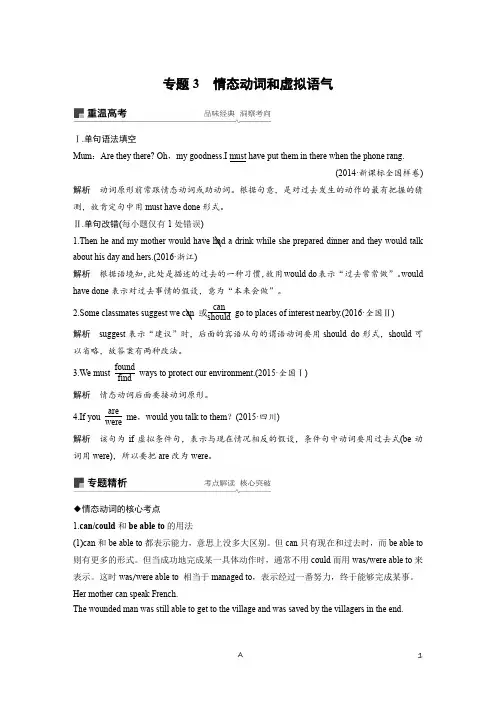
专题3情态动词和虚拟语气Ⅰ.单句语法填空Mum:Are they there? Oh,my goodness.I must have put them in there when the phone rang.(2014·新课标全国样卷) 解析动词原形前常跟情态动词或助动词。
根据句意,是对过去发生的动作的最有把握的猜测,故肯定句中用must have done形式。
Ⅱ.单句改错(每小题仅有1处错误)1.Then he and my mother would have had a drink while she prepared dinner and they would talk about his day and hers.(2016·浙江)解析根据语境知,此处是描述的过去的一种习惯,故用would do表示“过去常常做”。
would have done表示对过去事情的假设,意为“本来会做”。
2.Some classmates suggest we can 或canshould go to places of interest nearby.(2016·全国Ⅱ)解析suggest表示“建议”时,后面的宾语从句的谓语动词要用should do形式,should可以省略,故答案有两种改法。
3.We must foundfind ways to protect our environment.(2015·全国Ⅰ)解析情态动词后面要接动词原形。
4.If youarewere me,would you talk to them?(2015·四川)解析该句为if虚拟条件句,表示与现在情况相反的假设,条件句中动词要用过去式(be动词用were),所以要把are改为were。
◆情态动词的核心考点1.can/could和be able to的用法(1)can和be able to都表示能力,意思上没多大区别。
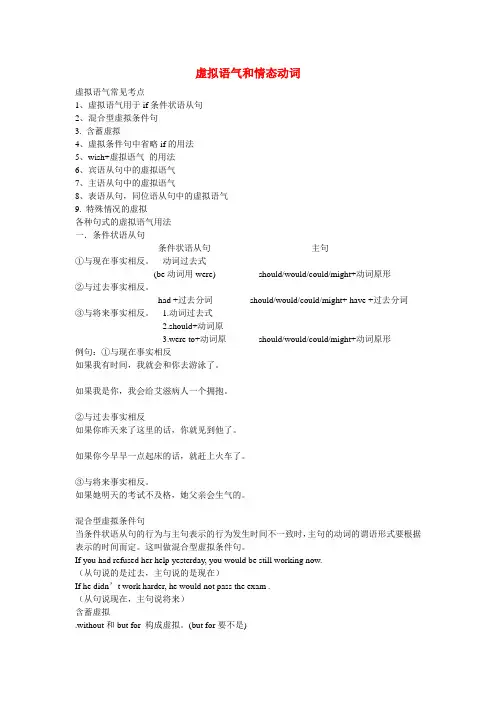
虚拟语气和情态动词虚拟语气常见考点1、虚拟语气用于if条件状语从句2、混合型虚拟条件句3. 含蓄虚拟4、虚拟条件句中省略if的用法5、wish+虚拟语气的用法6、宾语从句中的虚拟语气7、主语从句中的虚拟语气8、表语从句,同位语从句中的虚拟语气9. 特殊情况的虚拟各种句式的虚拟语气用法一.条件状语从句条件状语从句主句①与现在事实相反。
动词过去式(be动词用were) should/would/could/might+动词原形②与过去事实相反。
had +过去分词should/would/could/might+ have +过去分词③与将来事实相反。
1.动词过去式2.should+动词原3.were to+动词原should/would/could/might+动词原形例句:①与现在事实相反如果我有时间,我就会和你去游泳了。
如果我是你,我会给艾滋病人一个拥抱。
②与过去事实相反如果你昨天来了这里的话,你就见到他了。
如果你今早早一点起床的话,就赶上火车了。
③与将来事实相反。
如果她明天的考试不及格,她父亲会生气的。
混合型虚拟条件句当条件状语从句的行为与主句表示的行为发生时间不一致时,主句的动词的谓语形式要根据表示的时间而定。
这叫做混合型虚拟条件句。
If you had refused her help yesterday, you would be still working now.(从句说的是过去,主句说的是现在)If he didn’t work harder, he would not pass the exam .(从句说现在,主句说将来)含蓄虚拟.without和but for 构成虚拟。
(but for要不是)Without sunlight, people’s life would be different from today.But for your help, I wouldn’t have finished the work.Without your help, I would have failed.But for water, it would be impossible to live in the desert.省略。
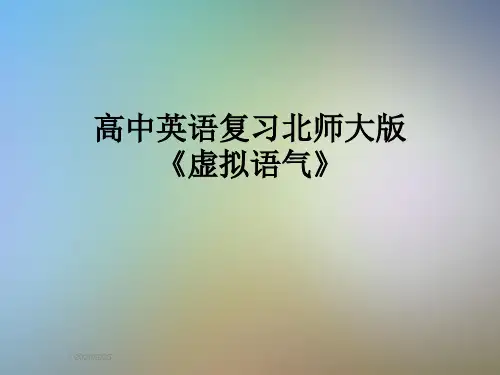
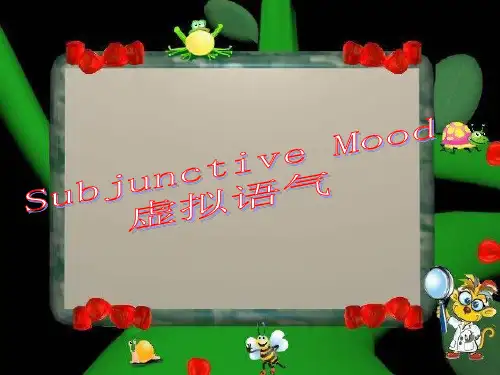
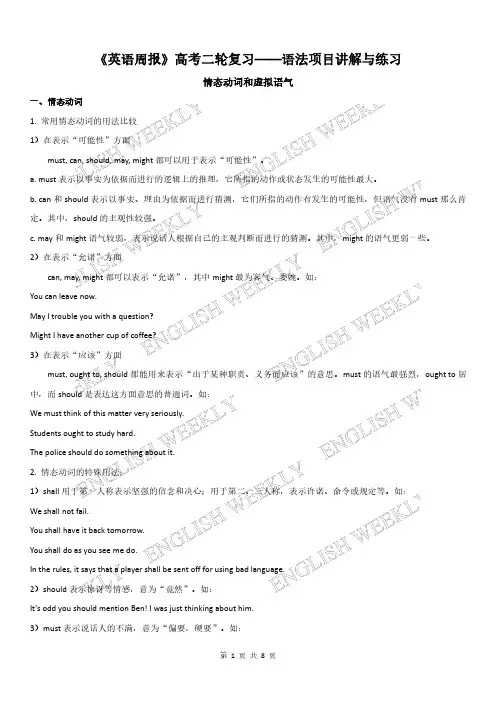
《英语周报》高考二轮复习——语法项目讲解与练习情态动词和虚拟语气一、情态动词1.常用情态动词的用法比较1)在表示“可能性”方面must,can,should,may,might都可以用于表示“可能性”。
a.must表示以事实为依据而进行的逻辑上的推理,它所指的动作或状态发生的可能性最大。
b.can和should表示以事实、理由为依据而进行猜测,它们所指的动作有发生的可能性,但语气没有must那么肯定。
其中,should的主观性较强。
c.may和might语气较弱,表示说话人根据自己的主观判断而进行的猜测。
其中,might的语气更弱一些。
2)在表示“允诺”方面can,may,might都可以表示“允诺”,其中might最为客气、委婉。
如:You can leave now.May I trouble you with a question?Might I have another cup of coffee?3)在表示“应该”方面must,ought to,should都能用来表示“出于某种职责、义务而应该”的意思。
must的语气最强烈,ought to居中,而should是表达这方面意思的普通词。
如:We must think of this matter very seriously.Students ought to study hard.The police should do something about it.2.情态动词的特殊用法:1)shall用于第一人称表示坚强的信念和决心;用于第二、三人称,表示许诺、命令或规定等。
如:We shall not fail.You shall have it back tomorrow.You shall do as you see me do.In the rules,it says that a player shall be sent off for using bad language.2)should表示惊讶等情感,意为“竟然”。
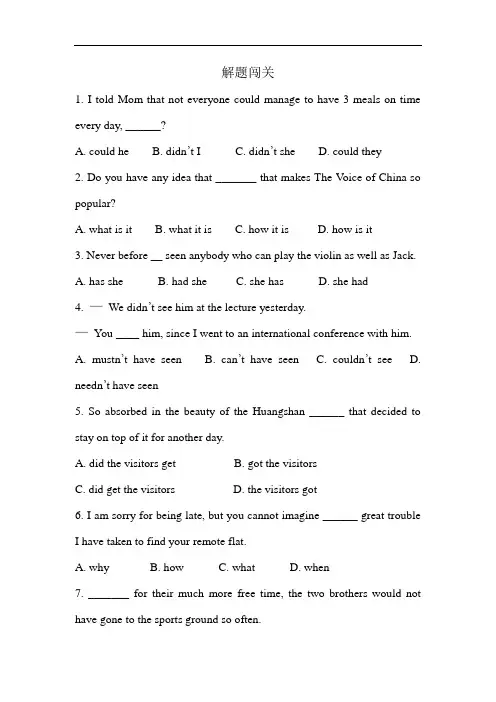
解题闯关1. I told Mom that not everyone could manage to have 3 meals on time every day, ______?A. could heB. didn’t IC. didn’t sheD. could they2. Do you have any idea that _______ that makes The V oice of China so popular?A. what is itB. what it isC. how it isD. how is it3. Never before __ seen anybody who can play the violin as well as Jack.A. has sheB. had sheC. she hasD. she had4. —We didn’t see him at the lecture yesterday.—You ____ him, since I went to an international conference with him.A. mustn’t have seenB. can’t have seenC. couldn’t seeD. needn’t have seen5. So absorbed in the beauty of the Huangshan ______ that decided to stay on top of it for another day.A. did the visitors getB. got the visitorsC. did get the visitorsD. the visitors got6. I am sorry for being late, but you cannot imagine ______ great troubleI have taken to find your remote flat.A. whyB. howC. whatD. when7. _______ for their much more free time, the two brothers would not have gone to the sports ground so often.A. If it is notB. Were it notC. Had it not beenD. If it were not8. The man in the picture is my dad. He didn’t know I was taking the picture then, or else he ______ around.A. would have turnedB. must have turnedC. should turnD. had turned9. New research suggests that children brought up on healthy diets _______ more intelligent than those eating junk food.A. had beenB. should beC. areD. were10. They ______ of the terrible situation in Thailand, otherwise they wouldn’t have gone there for sightseeing.A. wouldn’t hearB. didn’t hearC. haven’t heardD. don’t hear11. The bus hit against a tree in the fog and ________ to the deep valley, with ten passengers killed and twenty wounded.A. down did it rollB. down rolled itC. it down rolledD. down it rolled12. —There are a lot of leftovers from the party, aren’t there? —Yes, ________.A. people enjoyed the food very muchB. you needn’t have made so many sandwichesC. you shouldn’t have eaten so muchD. I enjoyed it very much13. —I went to work on foot yesterday, though it _____ cats and dogs.—You ______ by bus. It was probably because of this that you caught a cold.A. is raining; must have goneB. rained; would goC. was raining; should have goneD. has rained; could have gone14. How I wish every family _____ a large house with a beautiful garden!A. hasB. hadC. will haveD. had had15. I __reported it to our headmaster, but I failed to find him at that time.A. must haveB. may haveC. can haveD. would rather have16. It’s important that the hotel receptionist _______ that guests are registered correctly.A. has made sureB. made sureC. must make sureD. make sure17. Some great people said it was their primary school teachers that they were fond of ______ influenced their whole life.A. whatB. whichC. asD. who答案解析1. B。
情态动词的基本用法1.shall(1)用在第一、三人称的疑问句中,表示征求对方的意见。
►Shall Tom go there with me tomorrow?明天汤姆可以和我一起去那里吗?(2)用于第二、三人称陈述句中,表示说话人的命令、警告、威胁、许诺、决心等,意为“必须”。
►The school rules state that no child shall be allowed out of the school unless accompanied by an adult.学校制度规定,除非有成人陪同,任何孩子不准离开学校。
2.should(1)表示责任、义务、劝告、建议,意为“(按道理)应该”。
►You should listen to your doctor's advice.你应该听医生的建议。
(2)表示出乎意料的语气,意为“竟然,居然”。
►I am surprised that you should speak in such a way.我很惊讶你居然用那种口气说话。
3.must(1)表示“必须,应该”,语气强烈。
强调主观看法,只有现在时形式,否定式是must not(mustn't),表示“禁止”。
must开头的问句,其否定回答要用needn't或don't have to来表达。
►—Must I hand in the paper today?——我今天必须交作业吗?—Yes, you must.——是的,你必须交。
—No, you needn't/don't have to.——不,你不需要。
(2)表示推测,意为“一定”,用于肯定句。
►At 29 Russell must be one of the youngest ever international referees.29岁的拉塞尔想必是迄今为止最年轻的国际裁判之一。
高考英语语法复习专题8 情态动词和虚拟语气精品导学案(含解析)情态动词主要用来表示说话人的情感、态度等,是中学英语语法的重点,也是高考的热点,是单项填空必考的一个知识点。
情态动词在近五年高考中主要考查四点:情态动词表示推测和可能性的用法;情态动词与虚拟语气;情态动词表达“情感、态度、语气等”;情态动词表示“必要性”等方面的用法。
虚拟语气的考点主要集中在名词性从句、条件句中的用法,以及错综条件句中虚拟语气的应用。
一、情态动词表推测的用法注意:should (ought to)表示推测是高考考查的重点和难点。
如:—When can I come for the photos?I need them tomorrow afternoon. —They ________ be ready by 12:00.A.can B.should C.might D.need【解析】B A项表示推测时常用于否定句和疑问句中。
C项表示推测语气不太肯定。
should意为“按理说,理应”,既回答了顾客的询问,不失礼貌,又为照片有可能尚未洗好,顾客到时取不到留下了回旋的余地,体现了店主的精明与用词经过仔细推敲。
二、情态动词的其他用法1.can, could, may, might2.must, should3. need, dare4.shall/will/would4.shall/will/would4.shall/will/would二、情态动词+have done四、虚拟语气虚拟语气表示说话人所说的话不是事实,而是一种假设、愿望、怀疑或推测。
1.虚拟语气在条件句中的用法If it were to rain tomorrow, I should not drive my car. 如果明天下雨的话,我就不开车了。
(明天的情况还不知道)If I had done it in time, I should have had a good time. 如果我及时做的话,日子就好过多了。
第七节情态动词和虚拟语气考点一情态动词的基本用法1.can(1)表示能力。
需注意的是,could表示过去一般的能力,而was/were able to表示有能力而且成功地做成了某事。
However great the difficulties may be,we can overcome them.哪怕是再大的困难我们也能克服。
The fire spread through the building very quickly,but everyone was able to get out.尽管这场大火迅速蔓延了整个大楼,但是每个人都逃了出去。
(2)表示理论上的可能性,意为“有时候可能会”。
Everything can happen;everything is possible and probable.任何事情都有可能发生,没有什么是不可能的。
(3)表示请求和允许。
在问句中,could比can语气要委婉;但答语中要用can表示直截了当。
—Could I use your cell phone?——我可以用你的手机吗?—Of course you can.——当然可以。
(4)表示推测,常用于疑问句和否定句。
What can they be doing there?他们可能正在那里干什么?He can't be in the office,for the light has been turned off.他不可能在办公室,因为灯已关了。
[名师点津] can't/can never be too.../can't/can never be...enough表示“再……也不为过”。
You can never be too careful/careful enough while driving a car.开车时如何小心都不为过。
2.may(1)表示请求、允许,此时might比may的语气更委婉。
—May/Might I play basketball this afternoon?——今天下午我可以打篮球吗?—No,you may not.——不,不行。
(2)表示推测意为“可能、或许”。
We may go to the cinema tonight,but we are not sure yet.我们今晚或许去看电影,但还未确定。
(3)用于祈使句中表示祝愿。
May you be happy every day and succeed in your work!祝你每天都过得开心且工作顺利![名师点津] “may as well+动词原形”意为“最好,倒不如”。
There is nothing to do,so I may as well go to bed.没什么事可做,我还是上床睡觉好了。
3.must(1)表示“必须,应该”,must一般指主观,而have to指客观,表示“不得不”。
We must do everything step by step.我们一切都必须循序渐进地做。
I have to go now for I've a meeting 15 minutes later.我必须走了,因为15分钟后有个会。
(2)表示推测,意为“一定会”,此时不能用于否定句。
He must be ill.He looks so pale.他一定病了,他的脸色苍白。
(3)mustn't表禁止,而have to的否定式意为“不必”。
Smoking mustn't be allowed in the office.办公室里不许吸烟。
—Must we hand in our exercise today?——我们今天必须交作业吗?—No,you don't have to.——不,不必今天交。
[名师点津] must表示偏执、固执,意为“偏要,硬要”。
If you must smoke,please go out.如果你硬要吸烟,那就出去吧。
4.shall(1)用于第一、三人称的疑问句中,用于征求对方的意见。
Shall I buy some picture books for the children?要我给孩子们买些图画书吗?(2)用于第二、三人称的陈述句,表示说话人给对方的命令、警告、允诺或威胁;此外,当颁布法律、规定时也用shall。
You shall do as your teacher says.你得按你老师说的那样做。
5.should(1)表示劝告和建议,意为“应该”。
此时ought to比should语气要强。
You should/ought to put more effort into your work.你应该更加努力地工作。
(2)表示预测可能性,意为“按道理应该会”。
He left Paris in the morning.So he should arrive here by supper time.他早上离开巴黎,因此他晚饭前应该能到这里。
[名师点津] should表示惊讶、意外等情绪,意为“竟然”。
It is strange that such things should happen in our school.真奇怪,这样的事情竟然在我们学校发生了。
6.will/would(1)表示意愿,可用于各种人称。
We will never give up working,whatever happens.无论发生什么事,我们都不会放弃工作。
(2)表示“请求,建议”,此时would比will更委婉。
Would you come into the bar and have a drink with me? 你愿意进酒吧和我喝一杯吗 ?[名师点津] will/would表示习惯,意为“总是,习惯于”。
与used to相比,would 表示过去重复、习惯性动作;而used to则强调过去与现在的对比。
She'll listen to music,alone in her room,for hours.她总是独自一个在房间里听音乐,一听就是几个小时。
Last year our English teacher would tell us stories in English after class.去年我们的英语老师常常课后给我们用英语讲故事。
He used to spend all his money on food and drink,now he lives a simple life.他过去把钱都花在吃喝上,现在可节省了。
7.need/dareneed和dare既可作实意动词又可作情态动词,用作情态动词时,主要用于疑问句和否定句。
He need not go if he doesn't want to.如果他不想去,他就不必去。
How dare you say such a thing?你竟敢说出这种话呀?考点二“情态动词+have done”的用法—Wang Yaping was the second woman to be sent into space in China.——王亚平成为第二名被送入太空的中国女性。
—She must have gone through tough training.——她肯定受过艰苦的训练。
Mark needn't have hurried.After driving at top speed,he arrived half an hour early.马克本没必要那么匆忙。
他以最快速度开车,结果早到了半个小时。
考点三虚拟语气在非真实条件句中的用法If I were you,I would take action right away.如果我是你,我会立即采取行动。
If you had got up earlier,you would have caught the train.如果你早点起床,你就会赶上火车了。
If you should fail,what would you do?万一你失败了,你准备怎么办?考点四虚拟条件的三种特殊形式Were it Sunday tomorrow,we should go to the Great Wall.要是明天是星期日,我们就能去长城了。
If you had prepared in advance,you wouldn't be in such an awkward position now.如果你事先做好准备,现在就不至于那么被动。
But for you,we couldn't have carried out the plan.要不是你的话,我们(当时)无法实行那项计划。
考点五虚拟语气的其他情况1.wish后面宾语从句的虚拟语气我希望我是一只小鸟,能在天空自由飞翔。
2.表示主张、命令、建议、要求等词后的宾语从句中常用“(should+)动词原形”结构[名师点津] 当insist表示“坚持认为;坚持说”;suggest表示“暗示,表明”时后面的宾语从句不用虚拟语气。
The young man insisted that he did nothing wrong and should be set free at once.这个年轻人坚持认为他没有做错,坚决要求马上被释放。
The girl's pale face suggested that she was ill and I suggested that she go to see the doctor at once.这个女孩苍白的脸色表明她病了,我建议她马上去看医生。
Teachers recommend parents not allow their children under 12 to ride bicycles to school for safety.老师们建议父母,为了安全不要让他们12岁以下的孩子骑车上学。
3.用于主语从句、表语从句和同位语从句中(1)表示要求、命令、建议、意图、决定、推荐等意义的动词,构成it is+动词的过去分词+that ...时,that从句中的谓语动词用(should+)动词原形。
It is advised that the meeting (should) be put off until next week.有人建议会议推迟到下周举行。
(2)表示要求、命令、建议、意图、决定、推荐等意义的名词,如suggestion,proposal,advice,order,request等后面的表语从句和同位语从句中,谓语动词用(should+)动词原形。